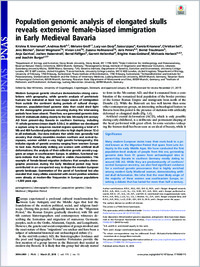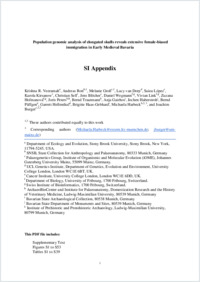Population genomic analysis of elongated skulls reveals extensive female-biased immigration in Early Medieval Bavaria
- Veeramah, Krishna R. Department of Ecology and Evolution, Stony Brook University, NY, USA
- Rott, Andreas State Collection for Anthropology and Palaeoanatomy, Bavarian Natural History Collections, Munich, Germany
- Groß, Melanie Palaeogenetics Group, Institute of Organismic and Molecular Evolution, Johannes Gutenberg University Mainz, Germany
- Dorp, Lucy van UCL Genetics Institute, Department of Genetics, Evolution and Environment, University College London, United Kingdom
- López, Saioa Cancer Institute, University College London, United Kingdom
- Kirsanow, Karola Palaeogenetics Group, Institute of Organismic and Molecular Evolution, Johannes Gutenberg University Mainz, Germany
- Sell, Christian Palaeogenetics Group, Institute of Organismic and Molecular Evolution, Johannes Gutenberg University Mainz, Germany
- Blöcher, Jens Palaeogenetics Group, Institute of Organismic and Molecular Evolution, Johannes Gutenberg University Mainz, Germany
- Wegmann, Daniel Department of Biology, University of Fribourg, Switzerland - Swiss Institute of Bioinformatics, Switzerland
- Link, Vivian Department of Biology, University of Fribourg, Switzerland - Swiss Institute of Bioinformatics, Switzerland
- Hofmanová, Zuzana Department of Biology, University of Fribourg, Switzerland - Swiss Institute of Bioinformatics, Switzerland
- Peters, Joris State Collection for Anthropology and Palaeoanatomy, Bavarian Natural History Collections, Munich, Germany
- Trautmann, Bernd State Collection for Anthropology and Palaeoanatomy, Bavarian Natural History Collections, Munich, Germany
- Gairhos, Anja Bavarian State Archaeological Collection, Munich, Germany
- Haberstroh, Jochen Bavarian State Department of Monuments and Sites, Munich, Germany
- Päffgen, Bernd Institute of Prehistoric and Protohistoric Archaeology, Ludwig Maximilian University, Munich, Germany
- Hellenthal, Garrett UCL Genetics Institute, Department of Genetics, Evolution and Environment, University College London, United Kingdom
- Haas-Gebhard, Brigitte Bavarian State Archaeological Collection, Munich, Germany
- Harbeck, Michaela State Collection for Anthropology and Palaeoanatomy, Bavarian Natural History Collections, Munich, Germany
- Burger, Joachim Palaeogenetics Group, Institute of Organismic and Molecular Evolution, Johannes Gutenberg University Mainz, Germany
-
07.03.2018
Published in:
- Proceedings of the National Academy of Sciences. - 2018, p. 201719880
English
Modern European genetic structure demonstrates strong correlations with geography, while genetic analysis of prehistoric humans has indicated at least two major waves of immigration from outside the continent during periods of cultural change. However, population-level genome data that could shed light on the demographic processes occurring during the intervening periods have been absent. Therefore, we generated genomic data from 41 individuals dating mostly to the late 5th/early 6th century AD from present-day Bavaria in southern Germany, including 11 whole genomes (mean depth 5.56×). In addition we developed a capture array to sequence neutral regions spanning a total of 5 Mb and 486 functional polymorphic sites to high depth (mean 72×) in all individuals. Our data indicate that while men generally had ancestry that closely resembles modern northern and central Europeans, women exhibit a very high genetic heterogeneity; this includes signals of genetic ancestry ranging from western Europe to East Asia. Particularly striking are women with artificial skull deformations; the analysis of their collective genetic ancestry suggests an origin in southeastern Europe. In addition, functional variants indicate that they also differed in visible characteristics. This example of female-biased migration indicates that complex demographic processes during the Early Medieval period may have contributed in an unexpected way to shape the modern European genetic landscape. Examination of the panel of functional loci also revealed that many alleles associated with recent positive selection were already at modern-like frequencies in European populations ∼1,500 years ago.
- Faculty
- Faculté des sciences et de médecine
- Department
- Département de Biologie
- Language
-
- English
- Classification
- Medieval and modern history
- License
- License undefined
- Identifiers
-
- RERO DOC 309438
- DOI 10.1073/pnas.1719880115
- Persistent URL
- https://folia.unifr.ch/unifr/documents/306652
Other files
Statistics
Document views: 60
File downloads:
- weg_pga.pdf: 94
- weg_pga_sm.pdf: 123

